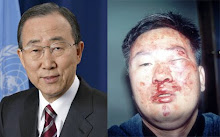http://www.wilsoncenter.org/topics/docs/InterKoreanRels_EnglishCoverage.pdf
SEOUL, Sept. 24 (Yonhap) -- South Korea's Park Chung-hee government pre-informed North
Korea that it would impose martial law south of the border in the early 1970s, Eastern European
dossiers acquired by a U.S. think tank said.
The documents, translated and made public by the Woodrow Wilson International Center for Scholars, are the first to show that Park's authoritarian regime sought to assure Pyongyang that its move -- which granted the South Korean leader near-dictatorial powers -- did not
mean to "offend" North Korea and would rather "guarantee the peaceful dialogue."
Park, who seized power in a military coup in 1961, declared martial law on
Oct. 17, 1972, dismissing the parliament and suspending the Constitution.
His government revised the Constitution later that year to lift term limits on
his presidency.
According to the Bulgarian foreign ministry that filed part of the dossier,
South Korea twice notified the North's Kim Il-sung government of its
imminent announcement of martial law; a day before the announcement and
again one hour earlier.
For the first notification, South Korea called a meeting at the truce village
of Panmunjom and said "some measures" were inevitable to root out
opponents of reunification.
A South Korean representative, whose name was not mentioned in the
document, "said that Park Chung-hee and Lee Hu-rak desire the
reunification of the country, but they have many opponents. That is why
some measures were necessary for the establishment of order in the
country," the document said.
Lee was the president's special envoy who facilitated an inter-Korean
reconciliatory statement in July that year.
The representative further explained "a statement" will be announced the
following day. North Koreans quoted in the dossier said he "asked it be
listened to carefully on our (the North Korean) part.
One hour before the decree was announced, South Korea again informed
the North "by telephone that at 19 o'clock an 'Emergency Statement' from
Park Chung-hee would be released on the radio, and they asked that we
listen to it," according to the North Koreans.
A day after the martial law was imposed, the two Koreas met again. Asked
by North Korea to explain, the South Korean representative said "strong
opposition" forces prompted the Seoul government to invoke martial law so
that it could modify the Constitution "without chaos and disorder in the
country."
The representative added that Park's emergency statement had "no points
that affected or offended the DPRK (North Korea)" and a new Constitution
would "guarantee the peaceful dialogue between the North and the South."
Park earlier revised the Constitution in 1969 to allow himself to run for a
third term. By declaring martial law and revising the Constitution again in
1972, he removed term limits on his presidency. He was assassinated by his
chief intelligence officer, Kim Jae-gyu, in 1979.
Some opposition leaders have claimed the Park regime used the cause of
reunification as an excuse to permanently rule the country, but the claims
had not been substantiated.
Also in the early 1970s, North Korea launched extensive diplomacy toward
its communist allies in East Europe as it was improving relations with the
South. North Korea invited ambassadors from Eastern Europe in 1972,
saying its "peace offensive" toward South Korea's Park government was
aimed at precluding U.S. and Japanese influence on the South and
eventually achieving reunification, according to the document
Kim Il-sung also sent Jeong Jun-taek, vice-premier of the Cabinet, to
Romanian President Nicolae Ceausescu, in September 1972, saying the
North has no intention of invading the South.
"If we start a war in South Korea, it can turn into a world war," Kim said,
according to records filed by the Romanian foreign ministry. "What should
we do? Taking the current situation into account, we thought the best thing
to do is to launch a peaceful offensive."
In talks with Ceausescu a year earlier, 1971, Kim Il-sung argued North
Korea had to seize a U.S. military ship, USS Pueblo, three years earlier
because it had illegally entered its territory. The U.S. ship is now displayed
along the main river in the North Korean capital. Washington has called for
its return.
If Americans "create situations like Pueblo ... then we are entitled to
capture them or to shoot them down. We keep our business to our territory,
we don't do it in the waters of the United States of America," Kim said.
hkim@yna.co.kr
(END
Subscribe to:
Post Comments (Atom)

No comments:
Post a Comment